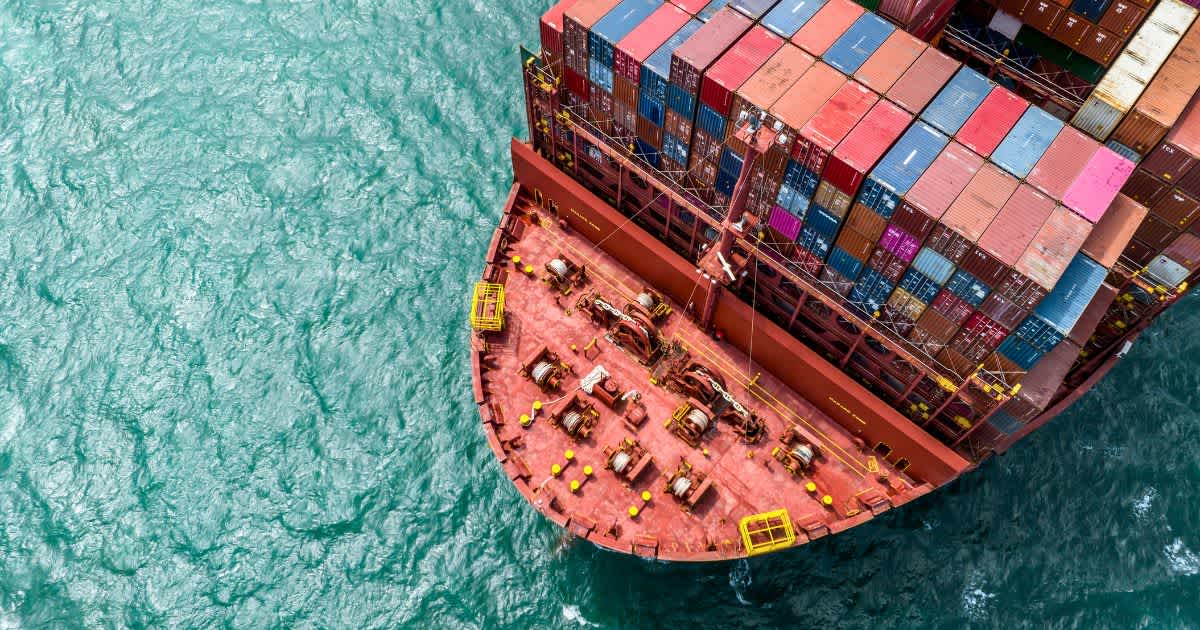Table of Contents
- What are Incoterms?
- Differences between Incoterms 2010 & 2020?
- Incoterms 2020 Overview & Their Significance
- Which Incoterms are appropriate for your procurement?
- 5 Tips for dealing with Incoterms
- Best practice: Which Incoterms are suitable for Line Up customers?
- Line Up supports you in making the right choice
Incoterms 2020 explained: overview & meaning
Reading Time: 7 min.

Whether machine components from the Far East, textiles from Bangladesh or plastic parts from Eastern Europe: anyone who procures internationally cannot avoid Incoterms. Chosen correctly, they avoid misunderstandings, delays and additional costs. Chosen incorrectly, they quickly lead to additional burdens or legal uncertainties.
What are Incoterms?
The term ‘Incoterms’ stands for ‘International Commercial Terms’ – a set of rules for interpreting international delivery terms published by the International Chamber of Commerce (ICC) based in Paris. Incoterms standardise which party (seller or buyer) assumes which obligations in relation to transport, loading, insurance, export/import processing and risk transfer.
The aim is to avoid misunderstandings. A simple addition such as ‘FOB Shanghai’ in the contract not only regulates the place of delivery, but also the distribution of costs and the transfer of risk between the contracting parties.
Incoterms are therefore indispensable for companies that procure or sell goods. This is particularly true in global sourcing, where different legal systems and languages come together.
Differences between Incoterms 2010 & 2020?
The current version of Incoterms dates from 2020 and replaced Incoterms 2010. The reason for this is that the ICC revises the rules every ten years to adapt them to current trading realities. The 2020 version includes the following changes, among others:
The former DAT (Delivered at Terminal) clause has been replaced by DPU (Delivered at Place Unloaded) in order to expand the scope of application. Now, the place no longer has to be a terminal.
With FCA (Free Carrier), it is possible to request transport documentation (on-board B/L) from the carrier in order to better comply with letter of credit requirements, for example.
Higher insurance requirements for CIP (Carriage and Insurance Paid To) as opposed to CIF (Cost, Insurance and Freight), where minimum coverage is still sufficient.
Clearer structuring and improved language of the rule texts for better application practice.
The Incoterms updated in 2020 thus offer greater flexibility and transparency – provided they are applied correctly and explicitly named in the contract (e.g. ‘CIF Hamburg – Incoterms® 2020’).
Incoterms 2020 Overview & Their Significance
Depending on the extent of the seller's obligations, Incoterms can be roughly divided into four groups:
E clause: Only provision of goods (EXW)
F clauses: Buyer organises main transport (FCA, FAS, FOB)
C clauses: Seller organises and pays for transport, but bears no risk (CFR, CIF, CPT, CIP)
D clauses: Seller bears full responsibility until the destination (DAP, DPU, DDP)
EXW – Ex Works
The seller makes the goods available at their own location. However, all other costs and risks – from collection to customs clearance – are borne by the buyer. EXW is simple, but often unsuitable if the buyer has no experience with exports.
FCA – Free Carrier
The seller hands over the goods to a named carrier at an agreed location. FCA is more flexible than EXW because it also covers shipments to ports or terminals. In addition, an on-board document can be requested, which is ideal for letters of credit.
FAS – Free Alongside Ship
While the goods are placed alongside the ship at the quay of the port of shipment, loading onto the ship is carried out by the buyer. This clause is only suitable for transport by ship, e.g. for bulk goods.
FOB – Free on Board
The seller bears the costs and risks until the goods are loaded onto the ship. From then on, the buyer is responsible. Important: FOB is only suitable for shipping loose goods, not containerised goods.
CFR – Cost and Freight
The seller organises and pays for transport to the port of destination, but the risk is transferred to the buyer as soon as the goods are loaded onto the ship. There is no obligation to take out insurance.
CIF – Cost, Insurance and Freight
Adds a minimum insurance obligation in favour of the buyer to CFR. However, the buyer is still responsible for damage once the goods have left the ship and should therefore check whether the insurance offered is sufficient.
CPT – Carriage Paid To
Similar to CFR, but suitable for all modes of transport. The seller pays for transport to the destination, but only bears the risk until handover to the first carrier.
CIP – Carriage and Insurance Paid To
CIP extends CPT to include comprehensive insurance. Since 2020, the seller has been required to take out insurance with higher coverage, which is particularly recommended for higher-value goods.
DAP – Delivered at Place
The seller delivers the goods to the agreed location. The buyer takes care of unloading and import customs clearance there. DAP is widely used, but offers the buyer little flexibility.
DPU – Delivered at Place Unloaded
Same as DAP, but with an additional unloading obligation for the seller. This clause is ideal if the goods are to be unloaded and handed over at a specific location, e.g. on a construction site.
DDP – Delivered Duty Paid
This is the most comprehensive obligation, whereby the seller delivers the goods duty paid to the destination. DDP is therefore convenient for the buyer, but risky for the seller, as they must be familiar with the import laws of the destination country.
Which Incoterms are appropriate for your procurement?
Choosing the right Incoterm clause directly affects your costs, responsibilities and risks, and thus the efficiency of your entire supply chain. Especially in international projects, it creates clear responsibilities towards freight forwarders, customs authorities and contractual partners. To make an informed decision, you should consider four key aspects:
Mode of transport
Some Incoterms such as FOB, FAS, CFR or CIF are intended exclusively for maritime transport – ideal for bulk goods, unsuitable for container logistics. Those who rely on multimodal transport (e.g. truck, rail, air freight) should switch to FCA, CPT or CIP. These clauses can be flexibly integrated into modern supply chains.
Air freight, sea freight or rail freight: choosing the right type of freight is crucial for the safe and efficient shipment of your products. Read more about this in our blog article on types of freight.
Market experience
Experienced companies with their own logistics and customs procedures can use EXW, but then bear full responsibility ex works. Inexperienced buyers are better off choosing FCA: here, the seller takes care of at least the export processing. This reduces risks associated with documents and export formalities.
Control and risk
Those who want transparency in the transport process and access to service providers should choose a buyer-controlled variant such as FCA or CPT. With CIP, the seller also takes care of insurance to the destination. Ideal for high-value or time-critical deliveries with manageable costs.
Cost distribution
With DDP, the seller bears all costs up to importation into the destination country, which is convenient for buyers but expensive and risky for sellers. This may be sensible for occasional imports or small shipments, but a more balanced model is recommended in the long term. DAP, for example, transfers customs clearance to the buyer, while the seller organises transport.
5 Tips for dealing with Incoterms
1. Always specify the year
Always use the wording ‘Incoterms® 2020’ to avoid misunderstandings with earlier versions.
2. Don't blindly adopt
Not every standard contract is suitable for your supply relationship. Check whether the clause really fits your logistics structure.
3. Clearly regulate loading and customs
Even within an Incoterm clause, there may be room for interpretation – e.g. regarding responsibility for export documents or insurance.
4. No container loading with FOB
FOB is not suitable for general cargo on pallets. For container freight, it is better to use FCA, CPT or CIP.
5. Add obligations to the contract
Incoterms do not regulate everything. Also clarify delivery times, packaging requirements or payment terms in the contract.
Best practice: Which Incoterms are suitable for Line Up customers?
Many Line Up customers have complex components or complete products manufactured in the Far East. At the same time, they want to optimise costs, limit risks and take advantage of flexible delivery options. In such cases, the following Incoterms have proven particularly useful:
FCA: Ideal for customers who want to organise the main transport themselves but entrust the manufacturer with the export processing.
CIP: The right choice for high-value goods when, in addition to transport, solid insurance is also required.
DAP: Useful for companies that want shipping to their own doorstep but want to handle customs clearance in their own country themselves.
All three clauses offer a clear division of tasks, enable coordinated processes with freight forwarders and create transparency in the supply chain with moderate risk.
Line Up supports you in making the right choice
Choosing the right Incoterm is not a formal act, but a strategic decision that has a direct impact on your costs, risks and delivery times.
As an experienced partner in international procurement management, Line Up helps you choose the right clause, draw up contracts clearly and minimise risks – including logistics coordination, import processing and supplier management.
Would you like to know which Incoterm clause is best suited to your project? Don't hesitate to contact us.
Newsletter Registration
Sign up now for our free Line Up newsletter and stay up to date.





